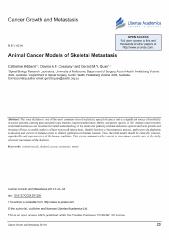Please use this identifier to cite or link to this item:
https://ahro.austin.org.au/austinjspui/handle/1/12139| Title: | Animal cancer models of skeletal metastasis. | Austin Authors: | Hibberd, Catherine;Cossigny, Davina A F;Quan, Gerald M Y | Affiliation: | ; Department of Spinal Surgery, Austin Health, Heidelberg Victoria 3084, Australia Spinal Biology Research Laboratory, University of Melbourne, Department of Surgery, Austin Health, Heidelberg Victoria 3084, Australia |
Issue Date: | 1-Aug-2013 | Publication information: | Cancer Growth and Metastasis 2013; 6(): 23-34 | Abstract: | The bony skeleton is one of the most common sites of metastatic spread of cancer and is a significant source of morbidity in cancer patients, causing pain and pathologic fracture, impaired ambulatory ability, and poorer quality of life. Animal cancer models of skeletal metastases are essential for better understanding of the molecular pathways behind metastatic spread and local growth and invasion of bone, to enable analysis of host-tumor cell interactions, identify barriers to the metastatic process, and to provide platforms to develop and test novel therapies prior to clinical application in human patients. Thus, the ideal model should be clinically relevant, reproducible and representative of the human condition. This review summarizes the current in vivo animal models used in the study of cancer metastases of the skeleton. | Gov't Doc #: | 24665205 | URI: | https://ahro.austin.org.au/austinjspui/handle/1/12139 | DOI: | 10.4137/CGM.S11284 | Journal: | Cancer growth and metastasis | URL: | https://pubmed.ncbi.nlm.nih.gov/24665205 | Type: | Journal Article | Subjects: | animal models cancer metastasis skeletal tumor |
| Appears in Collections: | Journal articles |
Files in This Item:
| File | Description | Size | Format | |
|---|---|---|---|---|
| 24665205.pdf | 1.58 MB | Adobe PDF |  View/Open |
Page view(s)
50
checked on Feb 21, 2025
Download(s)
124
checked on Feb 21, 2025
Google ScholarTM
Check
Items in AHRO are protected by copyright, with all rights reserved, unless otherwise indicated.
